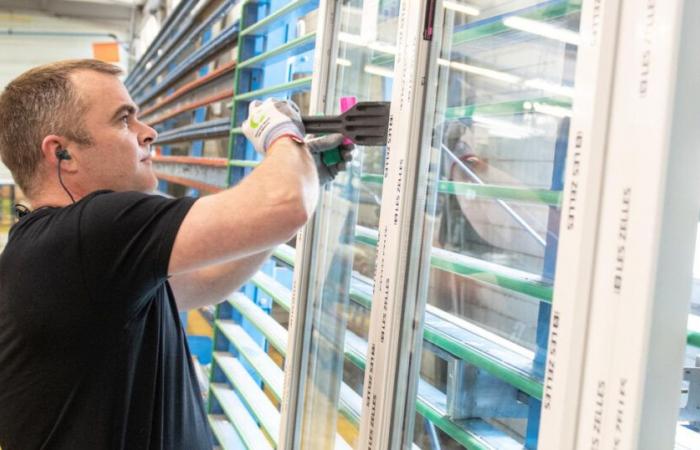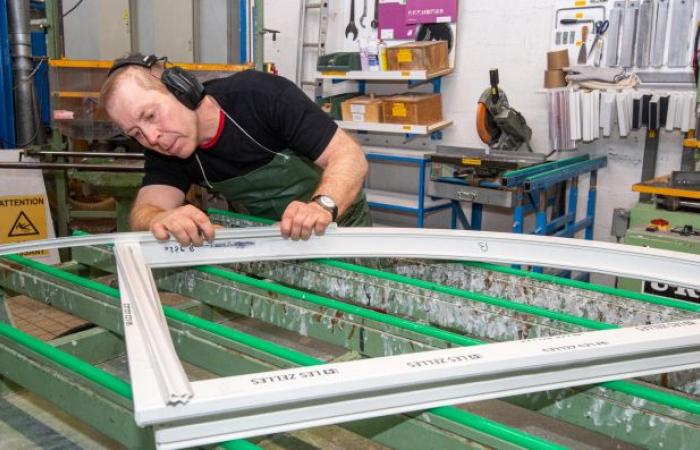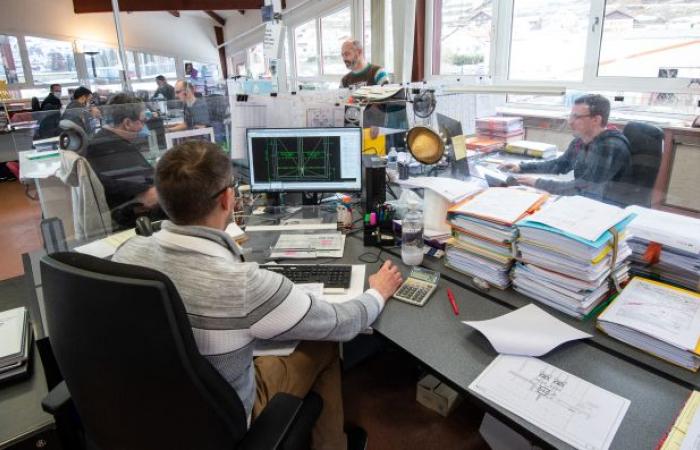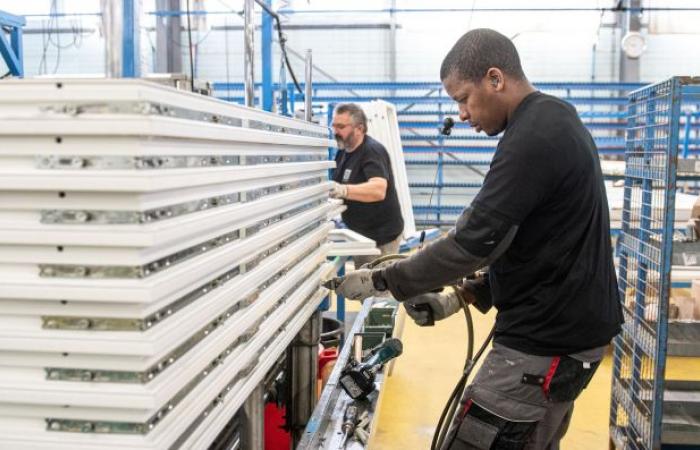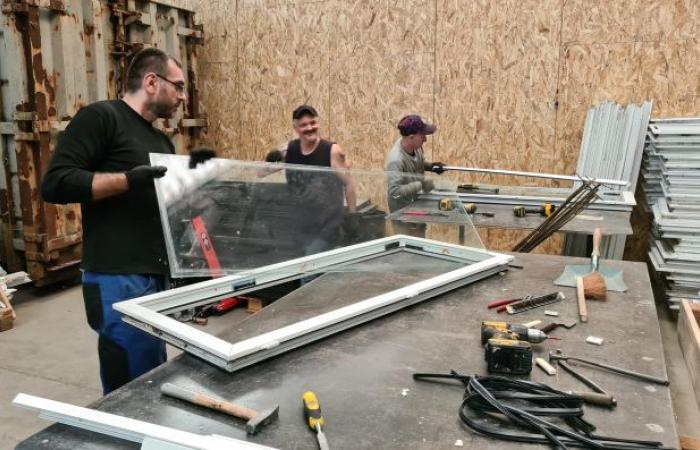On October 3, 8 and 9, the agenda of the president of the Pando group, Laurent Demasles was occupied by the same task: the definitive signing of a company buyout. The progress of the three external growth operations was deliberately timed over the same periods, to reinforce the symbolism of the moment. “The discussions took time, but the purchase promises took place at the end of July, two or three days apart. It would have been possible to do the closing on the same day, but I wanted to be present in all three companies “, explains Laurent Demasles. Window manufacturer based in Bresse, in the Vosges, the Pando group, representing a total of 145 million euros in turnover achieved with the companies Les Zelles, Bluntzer and Pando Recyclage, has therefore just consecutively taken over Menuiserie Moreau (turnover: €14 million; 65 employees), in Indre, Menuiserie Jung (turnover: €6 million; 25 employees) in Bas-Rhin, and France Volet (turnover: €15 million; 100 employees), in Aube.
Capital built around an FCPE
Discreet about the total envelope mobilized to finance these three operations, Laurent Demasles agrees to specify that the arrangement used is the same as that which allowed him to take over Les Zelles in 2021. “We have five partners in our shareholding”, details the leader. In addition to Bpifrance and BNP Paribas Développement, which control 40% of the capital, there is an FCPE (company mutual fund), a financial vehicle imagined by the Pacte law of 2019, which holds 39% of the Pando group and in which include all employees. The shareholding is completed by minority shareholders, Caisse d'Épargne Grand Est Equity, Institut Lorrain de Participation and Euro Capital.
Laurent Demasles is the president of the Pando group — Photo: Michel Laurent – Les Zelles
Employee shareholders
“All these partners agreed to reproduce the plan imagined during the takeover, because they are completely convinced of the philosophy of the project”, insists the president of the Pando group, who however prefers to remain discreet on the amount of the capital increase completed. to restructure the group's capital during external growth operations. With a majority in voting rights, employees can use the FCPE to “share the value created” within the group, with contribution systems allowing them to have €2,600 for €1,000 invested in the group's capital. “Concretely, the company would have to divide its value by 2 and a half to lose its initial investment,” specifies Laurent Demasles.
“With Les Zelles, we went from 80 million euros in turnover to nearly 150 million euros, which is almost a doubling of activity in seven years.”
From May 2025, the 200 new employees will be invited to be shareholders of the group. Then, over the following four years, until 2029, a capital increase will be offered to them in order to raise the level of FCPE in the group's shareholding, currently diluted to 35%. “Progressively, the FCPE will rise to 39 then up to 41% of the capital,” underlines the president of the Pando group. “In the end, the capital increase carried out with the employees will have almost compensated for the money that we raised with debt,” underlines Laurent Demasles.
Call to a banking pool
To complete external growth operations, the Pando group called on a banking pool, made up of LCL, Caisse d'Épargne Grand Est Europe, CIC EST, BNP and SG. For Laurent Demasles, this arrangement based on an FCPE presents “all the virtues”, since it allows not only to “bring in cash” but also to “financially consolidate” the group while involving employees in the project “because they will have become shareholders in their own company.”
After PVC, the group now wants to establish itself in wood — Photo: Michel Laurent – Les Zelles
A group that poses as a consolidator
With these three simultaneous transmissions, the Pando group workforce now reaches a total of 800 people. In terms of activities, the new group has a turnover of 180 million euros, a level which does not yet satisfy the president of the Pando group. “With Les Zelles, we went from 80 million euros in turnover to nearly 150 million euros, almost doubling activity in seven years,” recalls Laurent Demasles. On our new scope, with organic growth, I think that in 5 years, even 10 years, we should be able to reach 250 million euros in turnover.”
Reach a critical size
The president of the Pando group makes no secret of his strategy: to reach a critical size in the carpentry market. “Tomorrow, we will have to be at 300 million or even 500 million euros in turnover to be able to address all the systemic issues that arise in our market”, states Laurent Demasles who reveals that he is already at work to carry out new external growth operations. But for now, the manager's first priority is to tour the acquired companies, to present the group's roadmap and develop the business plans.
Take a stand on the wooden window
“We have a dedicated team, made up of seven people mobilized on the subject,” reveals the president of the Pando group. “It is this team that will move companies into another dimension, that of the group, which already operates throughout France.” Without predicting the results of the plan that his team will present to him, Laurent Demasles estimates that it will be necessary to inject no less than 10 million euros into the acquired companies to bring them to the expected capacity. Selling nearly 200,000 PVC windows each year, to which must be added 10,000 aluminum windows, the Pando group is now positioned in another market segment: that of wooden windows.
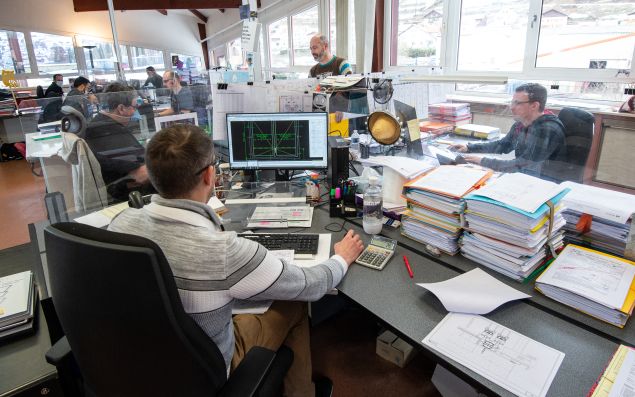
To improve the results of Zelles, Laurent Demasles started by “selling construction sites”, rather than just windows — Photo: Jean-François Michel
A market that is recovering
40 years ago, the French wooden window market represented nearly 20 million windows, which has now fallen to less than a million. “PVC and, to a lesser extent, aluminum, have largely replaced these volumes,” specifies Laurent Demasles. But for two years, the manager has observed a complete reversal of trajectory, notably under the effect of new thermal regulations: wood is once again favored by project owners for its insulating capabilities. Aluminum, for its part, is largely losing ground: a material that naturally conducts heat and cold, “it is a very carbon-intensive product, even recycled, because it takes a lot, a lot of energy to recycle it, much more than PVC has very few advantages, other than an aesthetic advantage,” says the director of the Pando group.
“If I want to follow the market trend, on a group scale, if I make 200,000 PVC windows, I should produce 30,000 wooden windows.”
Concretely, sales of aluminum windows collapsed by 35% over the year, while those of wooden windows jumped by 20%. A trend that Laurent Demasles sees stabilizing, describing a “yoyo” in prices. “But the project owners, the social landlords, who are important players in prescribing new environmental requirements, as well as the large general contractors, are all keeping pace and want to plan ahead at 10, 15 or even 20 years on a less carbon-intensive window”, describes the president of the Pando group. So many market elements that pushed Laurent Demasles and his team to want to create a “wood division” to be able to respond to their customers. With the production tools of Menuiserie Moreau and Menuiserie Jung, the Vosges group is already able to put nearly 10,000 windows per year on the market. “If I want to follow the market trend, on a group scale, if I make 200,000 PVC windows, I should produce 30,000 wooden windows,” says Laurent Demasles.

The Pando group now employs a total of 800 people — Photo: Michel Laurent – Les Zelles
A fragmented sector and artisanal businesses
The vast majority of wooden window manufacturers are often artisanal and have been operating for years in a bear market: the Vosges leader knows that the restart will be complicated and that the situation is favorable. “There are investments to be made and despite the market going up, these are very capital-intensive operations and require a lot of qualified labor,” describes Laurent Demasles. So many obstacles that the Pando group must be able to overcome to very quickly achieve industrial production capacities for wooden windows. The president of the group is in fact aiming for an annual production of “50,000 or even 100,000 wooden windows” per year. “We are convinced that the short-term, medium- and long-term fundamentals are there,” insists Laurent Demasles.
Ten million euros injected into PVC recycling
In parallel with the investments made to establish itself in wood, the Pando group is continuing its efforts in the recycling of PVC windows. The Vosges company has already injected a total of 10 million euros into a network of recycling sites, involving integration companies, glassmakers and profile manufacturers. “We have opened eight centers covering almost three quarters of the French territory, since we now operate from the North, Île-de-France, the Grand Est, Lyon, Marseille, Occitanie and even Bordeaux,” explains Laurent Demasles .
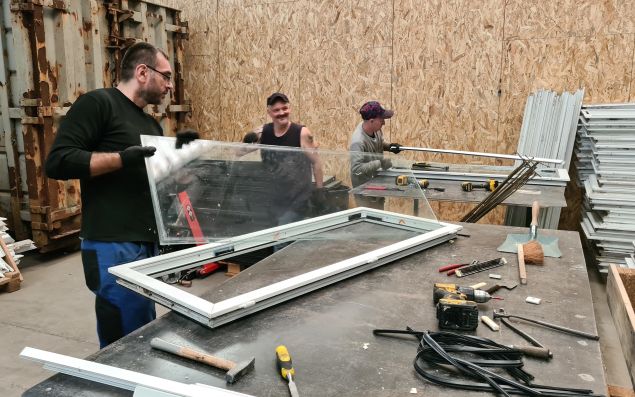
The Pando group and the Aithex economic integration association launched a PVC joinery dismantling center in 2023, in Rupt-sur-Moselle, in the Vosges — Photo: Jean-François Michel
The recipe is ready
The Vosges company's teams install between 80,000 and 100,000 PVC windows per year on renovation sites. A large mass which allowed the group to recover a total of 40,000 old windows to make new ones. “Today, we are not there yet, but we will soon be able to recover the tonnage of PVC necessary so that 100% of the windows we manufacture at Les Zelles are 70% recycled PVC,” says Laurent Demasles. . Two years of work were necessary, notably with the plastics manufacturer Benvic (turnover: €500 million; 630 employees), in Dijon, to find the recipe allowing PVC at the end of its life to once again become an extrudable material to manufacture new profiles.
Limited carbon footprint
At Rehau (turnover: €104 million; 120 employees), in Morhange in Moselle, an investment of 5 million euros was necessary to install a machine capable of extruding profiles from recycled PVC. In the end, “we are going to stop filling landfills”, welcomes Laurent Demasles, while noting that “the carbon footprint of PVC is very limited”, particularly compared to aluminum, despite the energy required to melt it, grind it and remelt it. Compared to a classic PVC window, which emits 70 kg of CO equivalent2 per square meter produced, the window resulting from the circular economy loop set up by the Pando group emits 30% less.

